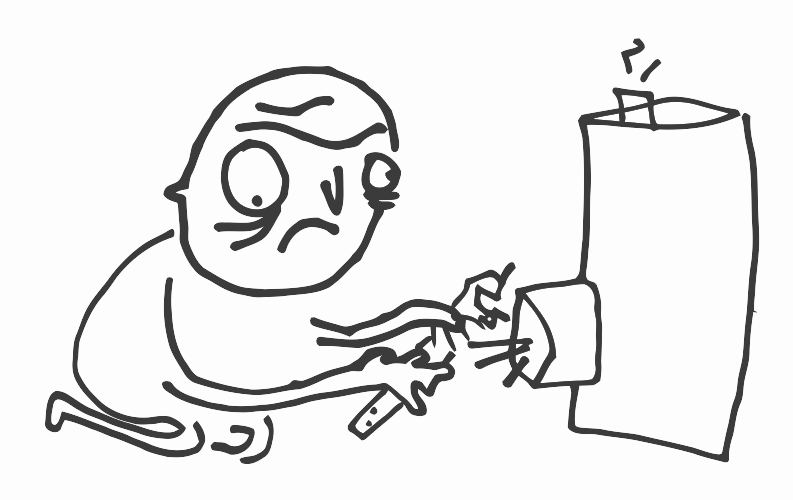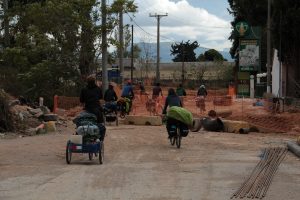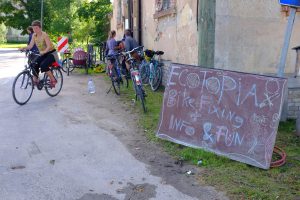On the Biketour we usually organise daily tasks using a rota (Australian/American: roster), so a plan where everyone can sign in to do a certain task a certain day. Usually people decide themselves when they want to do what and how often (as different people have different needs, some are more exhausted from cycling and living in a group than others), but it is good to have some guideline written down every how many days one should sign up for what task.
As part of the non-hierarchical and skill-sharing environment that we are trying to create, it is important that people don’t sign up for the same task all the time, but instead try to sign up for all the tasks, particularly the ones that you think you are not good at!
Here are some suggestions for daily tasks that have been used in the past. This is not a fixed list but can be used as a reference when deciding about the rota on the tour.
Short-term/day tasks
Cooking
The Cooking Team makes sure that enough food is acquired (bought/dumpster-dived) and prepares it for breakfast, lunch, and dinner. On cycling days this usually involves passing by a shop on the way (sometimes making a detour), as we can usually not carry food for multiple days, so we need to get food every day. On rest days this involves asking locals about food sources and possibly cycling to a near town.
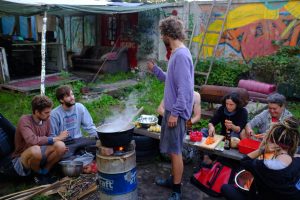 The Cooking Team can be split up into separate teams for breakfast, lunch and dinner, but often it has been one team for the combination dinner+breakfast+lunch (because this can be bought at once). Lunch can be prepared during breakfast or even during dinner, and people pack it into tupper-ware boxes for the way.
The Cooking Team can be split up into separate teams for breakfast, lunch and dinner, but often it has been one team for the combination dinner+breakfast+lunch (because this can be bought at once). Lunch can be prepared during breakfast or even during dinner, and people pack it into tupper-ware boxes for the way.
The Dinner Team should try to arrive early to be able to start cooking. It can team up with the trailers to carry the bought food.
Cooking is a delegating task: The Cooking Team can always ask for help to dumpster-dive, to get food, to make a fire, to chop vegetables.
For a group of 20 people, a Cooking Team of 3 people is a good size.
Cleaning
The Cleaning Team washes the pots and pans after each meal, makes sure that things are stored in a waterproof way for the night, and packs the trailers in the morning. Packing the trailers should be a priority, as they will be slow but need to arrive early.
Sometimes, the Cleaning Team also washes everyone’s dishes, as this is more hygienic.
For a group of 20 people, a Cleaning Team of 2–3 people is a good size.
Dumpster-Diving
The Dumpster-Diving team finds out about supermarkets on the way and possibly makes detours to go dumpster-diving there.
 Scouts
Scouts
The Scouts find out about the best possible route (sometimes also several days in advance). They take maps with them and are the first ones to leave in the morning. They mark the route drawing arrows on the street using bricks or chalk, or sometimes laying arrows out of stones, branches, pine-cones or trash. It can also make sense to mark other things on the way, such as water sources, swimming places, fruit trees or supermarkets.
If people are catching up with the Scouts, it is fine to ask them to help drawing arrows.
The Scouts should make a route announcement in the morning and/or draw/write the route on a piece of paper so that people can copy it.
The Scouts should take the communal phone. They can use it to call the project if they get lost on the way there, and people can call them to ask about the route if they get lost.
For wild-camping nights, the Scouts need to find a good spot to camp. The Scouts should call the Tail in the afternoon/evening to see how far behind people are, to avoid going so far that people will arrive in the night. On the wild-camping spot should be space enough, a place to get water (a public tap or a house to ask) close by, trees to find firewood, and it should be easily accessible for everyone, including people who pull the trailers. If there are people living close by, it is better to ask them if it is okay to camp there.
The Scouts will be the first ones to arrive at the sleeping place. Thus they can already make some preparations for the camp, such as collecting firewood.
The Scouts should be 2–3 people.
Tail
The Tail carries the bike tools and the first-aid kit and always stays behind the last people (unless they are fine with becoming the new tail or the after-tail). If someone gets stuck, they help them to fix their bikes or to find another solution. The tail carries the second communal phone, in order to be in contact with the scouts and to be called if someone has a problem.
The Tail should make a last round on the camp before leaving, to make sure nothing is left behind. It makes sense to sign up for Tail and Cleaning on the same day.
The Tail should be 1–2 people.
Trailers
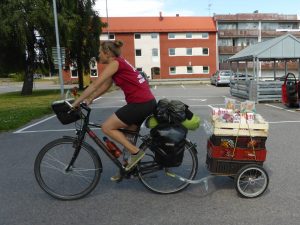 We have three communal trailers that need to be pulled. Make sure to check which trailers your bike can pull (not every bike fits every kind of attachment). You can also switch with someone else half-way if you want.
We have three communal trailers that need to be pulled. Make sure to check which trailers your bike can pull (not every bike fits every kind of attachment). You can also switch with someone else half-way if you want.
The trailers should arrive early, as they carry all the equipment that is necessary for cooking. This can be difficult, as carrying the trailers makes you slow.
When the trailers arrive, they should be taken off the bikes and put in a common area. The tarp can be unfolded there to keep everything the equipment and food dry and clean. This area is sometimes called the “Village Green”.
Wake-up call
Wakes up the group in a nice way (for example by playing music) in the morning.
Multiple-day tasks
Project Coordinator / Day Facilitator
Usually, the preparation of the tour is not 100% finished when the tour starts. Also, towards the end of the tour, our last contact with the projects is at least some months ago, so they might have forgotten about us.
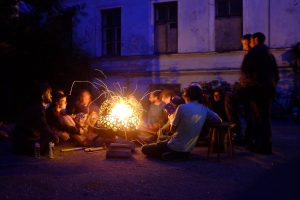 For each place where we stay along the way, some people should sign up to be the project coordinators. Their work starts several weeks before we arrive in the project. They read up about the e-mails that have been written to and from the project and see if anything still needs to be communicated. They send a reminder to the project and ask if anything has changed.
For each place where we stay along the way, some people should sign up to be the project coordinators. Their work starts several weeks before we arrive in the project. They read up about the e-mails that have been written to and from the project and see if anything still needs to be communicated. They send a reminder to the project and ask if anything has changed.
The project coordinators are the main contact between the group and the project. They should talk to our hosts and pass the information on to the group (so that not every single person asks our hosts whether we can use the showers).
The project coordinators should also make a schedule for our stay within the project, so find out about and schedule any possible activities:
- work in the project
- informational tour through the project
- Biketour info/bike-fixing event, inviting locals
- Critical Mass (get in contact with local Critical Mass groups)
- Workshops
- Visit other projects/groups/places close by
- Biketour circles
It also makes sense to have day facilitators for wild-camping rest days and maybe even cycling days, who make sure to schedule circles and workshops.
Blog
On our website, we can write blog posts. It is nice to make one about each project that we visit, and maybe even about things that we experience during the cycling days. It is good to ask around for photos to illustrate the blog posts.
Money
The Money Team is carrying the communal wallet.
Incoming and outgoing money should be documented in the money booklet. The date, amount and type of expenses (food, donation to project, incoming donation, etc.) should be written down. People should ask the Money Team for money to go shopping and return the return money. It makes sense to keep receipts, as they can sometimes be used to get funding.
The Money Team should keep track about who has given their donation for what period (without document who has given how much). This way people can be reminded if they have forgotten to donate.
When crossing national borders, the money team sometimes has to exchange currencies. In this case it can make sense to also offer to exchange people’s private money in the same go.
If we are running low in money, the Money Team should inform the group. If we are running high in money, the Money Team should arrange paying some into our bank account. Some money should be saved every week to have a buffer on future tours.
The money team should consist of at least 2 people.
Welcome Team
The Welcome Team introduces newcomers to how everything works. They show them the rota, this booklet, the circle decisions booklet, and other informational resources in the folder, ask them to fill out the papers about photo-sharing and dietary requirements, and explain everything there is to know about our daily routine.
Emotional Support / Awareness
It is good to have some people to talk to if someone doesn’t feel good about something, but doesn’t feel comfortable saying it in front of the whole group.
In addition there could be a “shout-out box” where people can anonymously put in messages that are read out in the circles.
 Activities/Actions/Games planner
Activities/Actions/Games planner
It can make sense to have some people think about group activities, games that improve group dynamics, and political actions to do on the way.
Irregular Tasks
Circle Facilitator
The role of the Circle Facilitator is described in the chapter about Consensus Decision Making.






